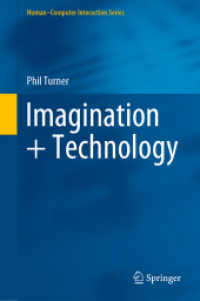Full Description
Inaccessible Access ethnographically addresses barriers to inclusion within knowledge-making. It focuses on the social, environmental, communicative, and epistemological barriers that people with disabilities confront and embody throughout the course of their learning and living and in the specific context of their higher education institutions and in research. It is presented by a neurodiverse, disabled, and non-cis cohort of authors, all of whom acknowledge a continuum of (in)access that is available to each contributor contingent on their inherent intersectionalities and alterities. The authors and editors of this book foreground the work that has yet to be done on recognizing the value of nonnormative ways of approaching, being in, and knowing research and higher education, particularly in cases where disablity-centered epistemologies are sidelined in confrontation with institutional norms, even within existing discourses concerning equality and alterity.
Contents
Preface
Mark T. Carew
Introduction
Kelly Fagan Robinson
1. Blended Models and the Co-Construction of Hidden Disability in Higher Education Settings
Carol Rivas
2. Performing Normal: Deafness, Intersectionality, and Academic Exhaustion
Julia F. Sauma
3. Making Space for Chronicity: Financial and Administrative Barriers to PhD Study
for People with Long-Term Health Conditions in the United Kingdom
Julia Modern
4. Agency and Subjectification in the Management of People with Disabilities: Inclusion of a Young
Man Diagnosed with Autism in the Labor Market
Valeria Aydos
5. Against Frictionless Access to Fieldwork: An Ethnography of Audio Describing Virtual Reality
Harshadha Balasubramanian
6. Video Meetings: Access and Disrupture
Rebekah Cupitt, Sara M. Acevedo, Sumi Colligan, Valerie Black, Mark Bookman, Erin L. Durban, Nell Koneczny, and Krisjon Olson
7. Access Killjoys: Join the Club
Michele Friedner
Acknowledgments
Notes on Contributors
Index








